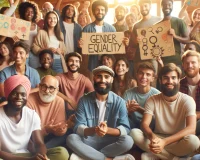Sexual and gender-based violence (SGBV) is not just an individual issue; it’s a community problem that requires a collective response. In Akwa Ibom State, community support plays a vital role in preventing SGBV, supporting survivors, and fostering a culture of respect and equality.
The Role of Community in Addressing SGBV
Communities are the bedrock of society. They shape our values, behaviors, and responses to challenges. When communities come together to address SGBV, they can:
- Raise Awareness: Community initiatives can spread knowledge about SGBV, its impact, and the importance of prevention and support.
- Provide Support: A supportive community can offer emotional, psychological, and practical assistance to survivors, helping them to heal and rebuild their lives.
- Challenge Norms: Communities have the power to challenge and change harmful gender norms and stereotypes that perpetuate violence.
- Promote Accountability: By holding perpetrators accountable and advocating for justice, communities can deter future violence and reinforce the message that SGBV is unacceptable.
Successful Community Initiatives in Akwa Ibom State
Several community-driven initiatives in Akwa Ibom State have made significant strides in combating SGBV:
- Community Watch Groups: These groups monitor and report cases of SGBV, ensuring that incidents are promptly addressed and perpetrators are held accountable.
- Support Networks: Informal networks of friends, family, and neighbors provide essential support to survivors, from offering a safe space to sharing information about available resources.
- Awareness Campaigns: Local organizations and community leaders organize campaigns to educate the public about SGBV, challenging myths and misconceptions.
- Workshops and Training: Community-based workshops and training sessions equip individuals with the skills to recognize, prevent, and respond to SGBV.
How Individuals Can Contribute
Every individual has a role to play in creating a supportive and proactive community. Here are some ways you can make a difference:
- Educate Yourself and Others: Learn about SGBV, its impact, and how to support survivors. Share this knowledge with your friends, family, and community.
- Speak Out: Challenge harmful attitudes and behaviors when you see them. Speaking out against SGBV can help change the culture of silence and stigma.
- Support Survivors: Offer a listening ear, believe their experiences, and help them access support services. Your support can make a significant difference in their recovery.
- Volunteer: Get involved with local organizations working to combat SGBV. Your time and skills can contribute to their efforts and amplify their impact.
- Advocate for Change: Support policies and initiatives that aim to prevent SGBV and support survivors. Advocacy can include signing petitions, attending rallies, and engaging with policymakers.
Building a Supportive Community
Creating a supportive community requires intentional efforts and ongoing commitment. Here are some steps to build a community that actively combats SGBV:
- Form Support Groups: Establish or join support groups for survivors and allies. These groups can provide a safe space for sharing experiences and strategies for prevention and recovery.
- Engage Community Leaders: Involve religious, traditional, and community leaders in SGBV initiatives. Their influence can help shape attitudes and behaviors within the community.
- Organize Community Events: Host events such as awareness walks, seminars, and workshops to engage the community and raise awareness about SGBV.
- Leverage Media: Use local media, including radio, television, and social media, to spread awareness and share information about resources and support services.
- Create Safe Spaces: Ensure that community spaces, such as schools, workplaces, and public areas, are safe and inclusive for all individuals, especially those at risk of SGBV.
Community support is a powerful force in the fight against sexual and gender-based violence. By coming together, we can raise awareness, support survivors, challenge harmful norms, and promote accountability. In Akwa Ibom State, every individual and group has a role to play in creating a safer and more equitable community. Let us harness the power of community support to combat SGBV and build a future where everyone can live free from violence and fear.






